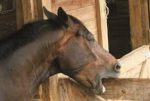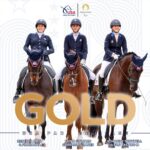 Your horse presses his top teeth against a solid object, arches his neck, and swallows air in a rocking motion. A grunting or gulping noise emerges. This is cribbing. Its true cause is unknown but genetics along with stressful circumstances appear to be the underlying problems. Cribbing is such a seriously addictive habit that many horses will actually prefer it to eating, and so they will slowly waste away.
Your horse presses his top teeth against a solid object, arches his neck, and swallows air in a rocking motion. A grunting or gulping noise emerges. This is cribbing. Its true cause is unknown but genetics along with stressful circumstances appear to be the underlying problems. Cribbing is such a seriously addictive habit that many horses will actually prefer it to eating, and so they will slowly waste away.
Early weaning can lead to this negative behavior later in adult horses. While there’s nothing you can do to change the past, you can take measures to reduce physical discomfort and mental strains that contribute to cribbing. Cribbing collars are tormenting. They may discourage the behavior but they do not relieve the urge.
Managing your horse’s conditions will help lessen the behavior. Here are some suggestions:
Provide freedom to graze and roam. This will have a remarkable effect on stopping this habit. If this is not feasible, give him as much outdoor space as possible.
Keep hay in front of your horse at all times. This one simple change will calm your horse’s demeanor.
Do not isolate your horse. Non-cribbers will not “catch” the cribbing habit by seeing another horse do it.
Consider ulcers. Most cribbers have ulcers. Stress, forage restriction, and stalling make things worse. Basic nutritional management to cure ulcers includes supplying hay that is always available 24/7, plentiful water consumption, avoiding starchy feeds (such as oats and corn) and sweet feeds, and restoring microbial populations through pro/prebiotic use.
For more information from Dr. Juliet Getty www.gettyequinenutrition.biz



